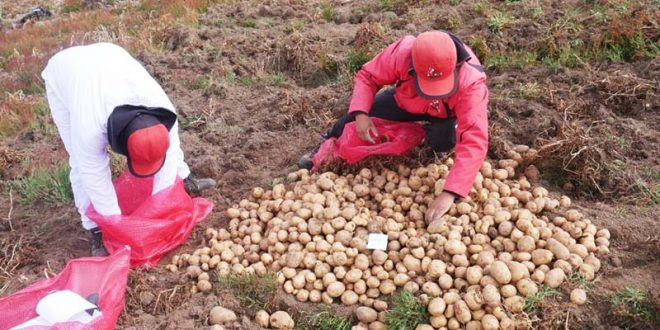The International Potato Center (CIP), with support from the Crop Trust, through its Crop Wild Relatives Project – a global initiative to adapt agriculture to climate change, has developed a new spud variety called CIP-Matilde.
This ‘new option’ for dealing with late blight, a wind-borne disease that can destroy a field of plants in a matter of weeks, is the latest example of using the wild relatives of crops to adapt agriculture to new threats, according to SeedQuest.
Based on the latest experts’ opinions, CIP-Matilde will have almost complete resistance to late blight and it is a result of a long-term effort to preserve, study, and use the potato’s wild relatives in breeding.
The new variety, CIP-Matilde, was named after scientist Matilde Orrillo, who pioneered CIP’s use of wild species in potato breeding in the 1980s. Infield evaluations at 10 locations, CIP-Matilde’s yields were comparable to those of Peru’s most popular potato variety, Yungay. However, whereas regular fungicide applications were needed to prevent late blight from devastating the Yungay fields, CIP-Matilde grew well without any fungicides.
As climate change increases the risk of crop diseases, farmers need more robust crop varieties. The hardy wild cousins of cultivated crops can come in handy for this. Crop wild relatives have evolved to withstand harsh conditions like extreme heat and drought and through a process called pre-breeding, scientists can transfer these useful traits into cultivated varieties. It’s a laborious process, but the results are worth it.
Though late blight is widely controlled with agrochemicals, millions of farmers are unable to afford or apply them as often as needed, resulting in about USD14bn in crop losses annually, primarily in developing countries.
CIP partnered with the Peruvian nonprofit Grupo Yanapai and more than 40 farmers in two regions of Peru’s Central Andes in a “participatory varietal selection” process that resulted in a shortlist of five potential varieties, from which the farmers selected CIP-Matilde.
This work was supported by the Government of Norway through the “Adapting Agriculture to Climate Change: Collecting, Protecting and Preparing Crop Wild Relatives” initiative, managed by the Crop Diversity.
Crop Wild Relatives Project makes all its products available to others under the rules of the Plant Treaty, an international agreement to foster the conservation and sustainable use of crop diversity.







